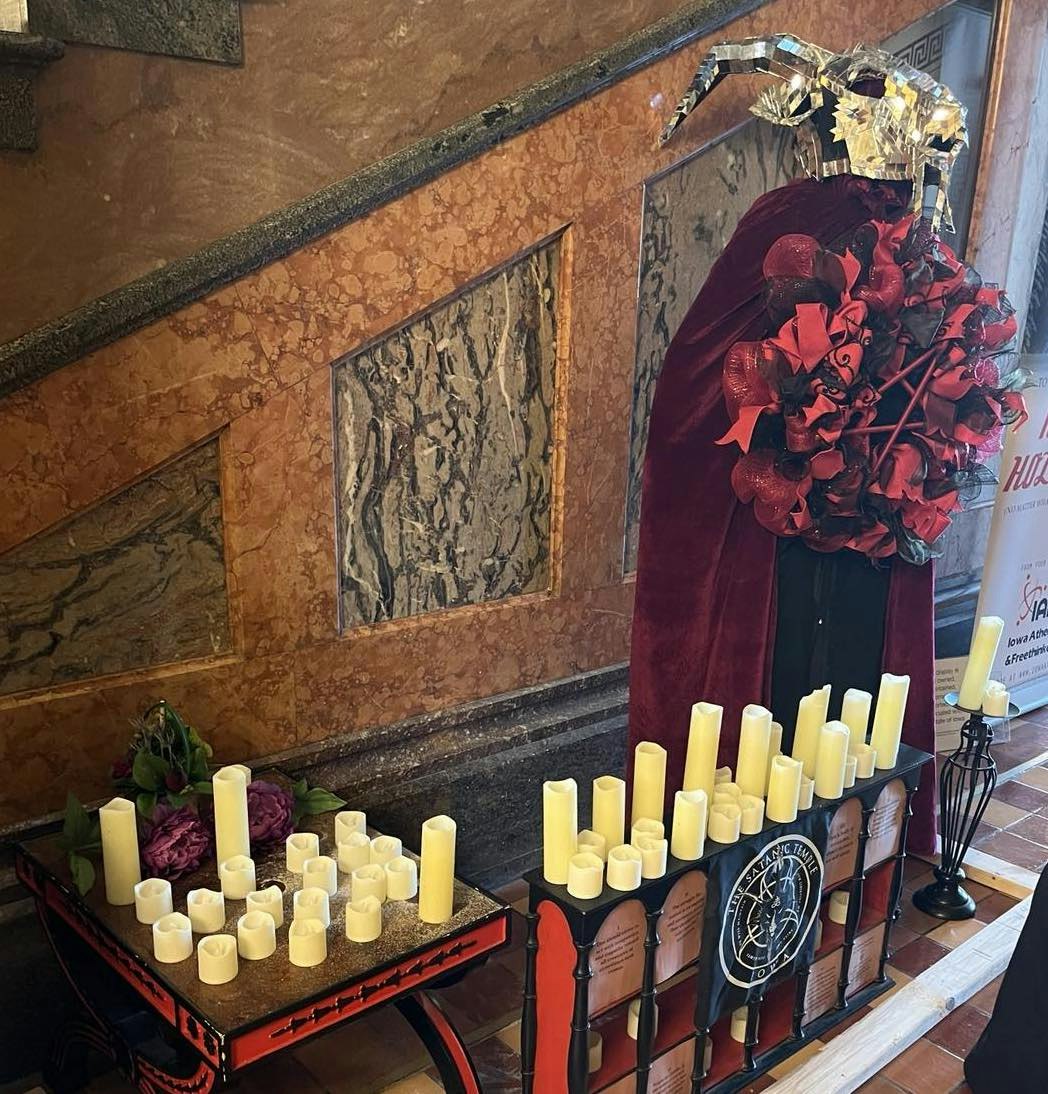
Satanic Temple display in the Iowa state capitol, photographed by Laura Belin
Randy Evans is executive director of the Iowa Freedom of Information Council and can be reached at DMRevans2810@gmail.com.
I really should not be surprised by some comments that represent what passes for civic dialogue in Iowa these days.
The latest example leaves me shaking my head, not just at the events themselves but at the reactions. Mrs. Gentry, my history and government teacher in high school, would be dismayed by intelligent people misunderstanding one of the foundations upon which the United States was established — that foundation being the desire of people for intellectual freedom.
How I wish I could still drop by the Gentry home, park myself on Mrs. G’s couch and dive into an in-depth conversation with her and Mr. G about the events that transpired in recent days at the Iowa Capitol. Some people’s mistaken notion of what religious freedom involves has brought the spotlight to Iowa from as far away as Great Britain’s BBC.
The trigger for all of this attention was the decision by the Satanic Temple of Iowa to temporarily erect a small altar with candles and a caped, ram’s-head figure representing the pagan idol Baphomet. The display was off the capitol rotunda next to the grand staircase, not far from where another group placed the traditional Christian nativity scene.
Faster than you could slide down a chimney, controversy boiled up.
Some politicians, including Republican presidential contender and Florida Governor Ron DeSantis, called on state officials to remove the display.
One member of the Iowa legislature, State Representative Brad Sherman, a Williamsburg pastor, urged adoption of legislation next session that would keep satanic symbols such the Baphomet display out of the capitol, the icon of Iowa’s democracy. Sherman called the display blasphemous.
“For those who wish to worship Satan, they are free to do so on their private property,” he wrote in his newsletter, the Sherman Liberty Letter.
“It is a tortured and twisted interpretation of law that affords Satan, who is universally understood to be the enemy of God, religious expression equal to God in an institution of government that depends upon God for continued blessings,” Sherman wrote.
Other politicians weighed in in ways Mrs. G would have found to be more in sync with our First Amendment rights.
State Representative Jon Dunwell, a Republican lawmaker from Newton, also is a minister. He called the Satanic Temple display objectionable, but he added a cautionary note.
Writing on Facebook, Dunwell said,
I don’t want the government dictating, approving, or regulating religious expression. I would rather have an evil blasphemous display or no display at all than have the state dictate what they think is appropriate.
I write that as a Bible-believing, Jesus is the only way, Pastor and elected leader who respects the constitution.
I am SHOCKED so many want to give up their freedom, so they don’t have to see a display they disagree with.
Governor Kim Reynolds took a reasonable stand on the display, although she could have been more straightforward in her defense of equal treatment by state government of various forms of religious expression.
Reynolds said in a statement, “Like many Iowans, I find the Satanic Temple’s display in the Capitol absolutely objectionable. In a free society, the best response to objectionable speech is more speech, and I encourage all those of faith to join me today in praying over the Capitol and recognizing the nativity scene that will be on display – the true reason for the season.”
The First Amendment rights belong to all people. They are not just available to those who follow a particular religion or believe a certain way or say things the same way we might.
Intellectual freedom does not mean a vocal segment of society should be able to silence a smaller segment for having the temerity to think differently or believe differently or worship differently or want to read books that others dislike.
Sometimes in a country built on intellectual freedom and freedom of expression, we may be offended by what we hear or what we see. Mrs. G’s eyes would twinkle when she reminded me of that fact of life during those comfy couch conversations many years ago.
The controversy over the Satanic Temple vandalism illustrates our divided times in another way, too:
Michael Cassidy, 35, of Lauderdale, Mississippi, was charged December 14 with fourth-degree criminal mischief for demolishing the Baphomet statue and tossing its head in a capitol trash can. If found guilty, he faces up to one year in prison and a $2,500 fine.
By week’s end, like-minded people around the United States had donated $40,000 to his legal defense fund.

1 Comment
there have never been clear, consistent, and unanimous takes on, or applications of these matters
One might hope that the dramatic (and ongoing) reversals of many precedents by the current Supreme Court would be enough to demonstrate to folks that these matters are always the subject of contestations of power, matters of politics. The facts on the ground as it were is that the people in charge get to decide what the law is, The Rule of Law not mankind is a theo-logical myth. As for the Governor once again asserting (in her acting role as Gov!) the supremacy of her Christian ideology being “reasonable” I guess that speak for itself and we know from her anti-black backlash moves against protest and her attacks on public education and healthcare how she feels about (and acts on) questions of limiting speech when it suits her cause. If folks are interested in more of the history around these issues: https://www.fivefourpod.com/
dirkiniowacity Wed 20 Dec 10:51 AM